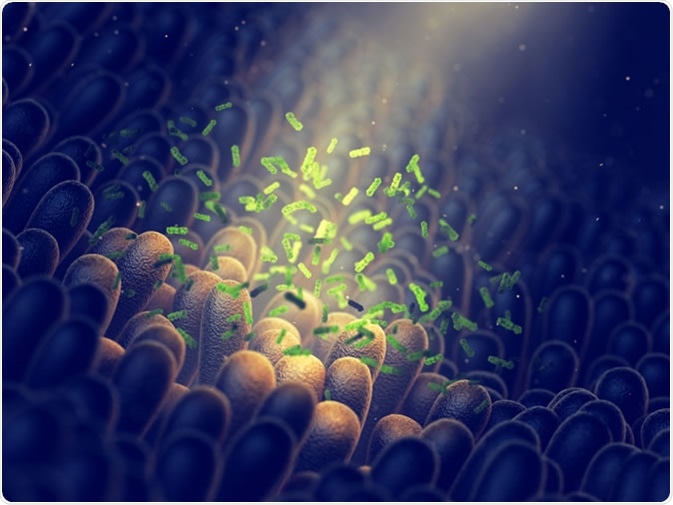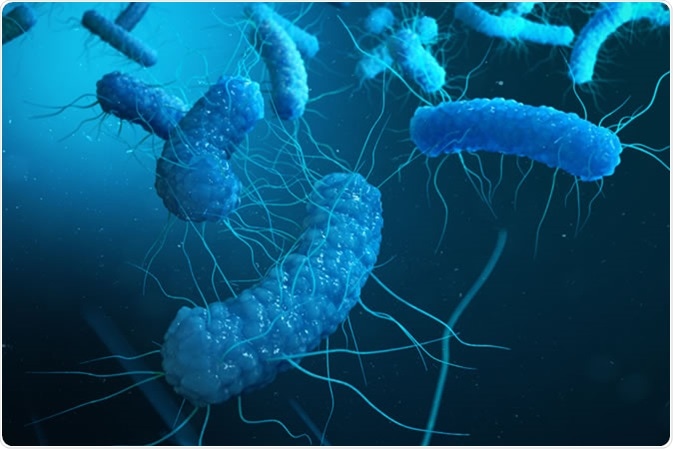Skip to:
What is the Gut Microbiota?
“Microbiota” is a term used to describe the collection of microorganisms (bacteria, archaea, and eukaryotes) living in a particular environment. One such environment that hosts numerous microorganisms is the human gut.
The gut microbiota provides essential functions to the human host, such as providing strength and integrity to the gut, shaping the epithelium of the intestines, providing protection against pathogenic microorganisms and regulating the host’s immune system.

Intestinal bacteria, gut flora health - Illustration Credit: nobeastsofierce / Shutterstock
What Influences the Gut Microbiota?
The microorganisms that make up the gut microbiota are acquired when we are born, and can change over time based on factors such as diet, illness, and the consumption of antibiotics during life.
It should also be noted that the microorganisms in the gut microbiota are selected to thrive in specific conditions, due to the fact that energy sources in the gut are limited. Therefore, only those microorganisms that can ferment dietary/host carbohydrates or obtain energy from sulfur reduction thrive in the gut.
Do Host Genetics Play a Role?
Are certain microbial species in the gut microbiota “heritable”?
The role of host genetics in shaping the gut microbiota is less known, however, studies are being carried out to investigate the possible link. For example, it has been shown that while there is a lot of difference in the diversity of the microbiota, family members often share similarities compared to those who are not related.
There is, of course, a possibility that this is due to family members eating a similar diet, however some bacteria have been shown to be “heritable”.
A study by Goodrich and co. investigated the microbiota of 1,081 people including 177 identical (monozygotic) twin pairs and 245 non-identical (dizygotic) twin pairs. The authors found that the microbiota of these individuals was a typical “Western diversity profile”, dominated by the phyla Firmicutes, Bacteroidetes, and Proteobacteria. They also found that the highest similarity was seen in samples from the same individual, and that samples from related individuals were more similar than samples from unrelated individuals.

Proteobacteria - Image Credit: Rost9 / Shutterstock
Further, they found that the microbiota of identical twins was more similar than that of non-identical twins, and that there were some taxa that appeared to be heritable. The most heritable family of bacteria, Christensenellaceae, was shown to co-occur with other heritable bacteria as well as with methanogenic archaea. This shows that the diversity of the gut microbiota may not sorely be driven by environmental factors such as diet.
Is there a link between specific genes and specific bacterial species in the gut microbiota?
A study by Zhernakova and co. investigated the link between the gut microbiota and host factors. Here, they recruited 1,135 participants, which included 474 men and 661 women. They used a sequencing-based approach to investigate the microbiome, and then compared this to other factors related to the participants, such as biomarkers, disease, smoking status, and so on.
One biomarker the authors investigated was chromogranin A, which indicates neuroendocrine system activation. When comparing the levels of chromogranin A and microbiota diversity, the authors found that lower levels of chromogranin A was associated with an increase in gut microbiota diversity. Further, they found that the presence of 61 species was associated with chromogranin A, which make up around 53% of the gut microbiota composition. This shows that regulation of a particular gene (chromogranin A) can influence the composition of the gut microbiota.
Can Genome Wide Association Studies be used to link host genes to an abundance of specific bacteria in their gut microbiota?
Genome-Wide Association Studies (GWAS) is a technique that compares genetic variation between many individuals to see if a phenotype is associated with a particular genotype. Could this approach be used to determine what genotype influences diversity in the gut microbiota (phenotype)?
Davenport and co. used a GWAS approach to study the link between around 200,000 host genotypes and the diversity of fecal microbiota in a Hutterites population. The Hutterites are a religious group in North America, and they live and eat as a community, therefore dietary and environmental effects on inter-individual microbiota would be limited.
The GWAS found that there are 8 taxa of bacterial species whose presence was associated with particular genetic variations. Of note, the presence of the genus Akkermansia was associated with a genetic variation around the PLD1 gene. Interestingly, studies had shown that Akkermansia is known to influence body weight, and that the PLD1 gene is associated with body mass index. If these associations are true, then it would seem that the presence of certain bacterial species in the human gut microbiota can be influenced by host genetics, and thus the genotype of the human host may be a factor that influences the diversity of bacterial species in the gut microbiota.
Further Reading
Last Updated: Sep 24, 2019